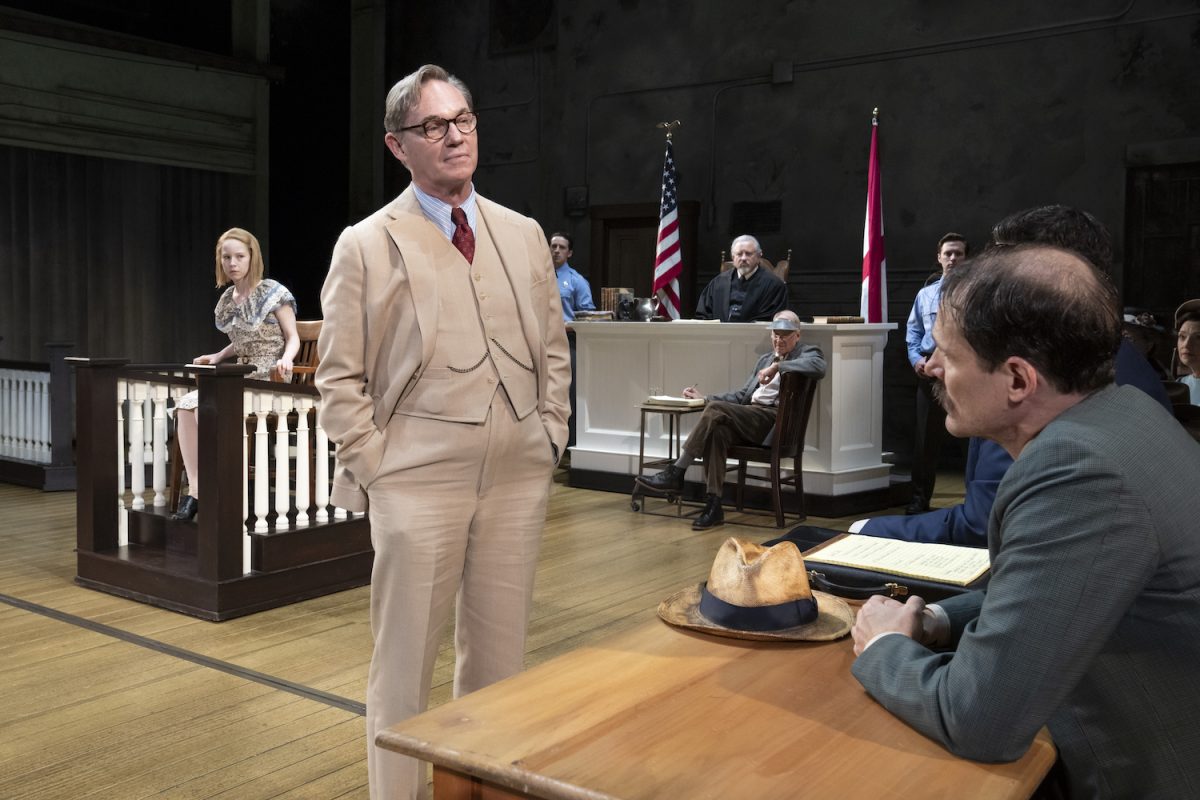Hancher Auditorium’s final production of “To Kill a Mockingbird” closed its curtains to thunderous applause on Sunday. Adapted for the stage by Academy Award winning screenwriter Aaron Sorkin, the play tells the familiar story of Atticus Finch — played by Richard Thomas, a small-town lawyer who accepts the case to defend a Black man in 1930s Alabama.
It also features Atticus’s children Scout (Scout Backus), and Jem (Justin Mark), as well as their friend Dill (Steven Lee Johnson). Scout Finch is the narrator of the 1960 novel by Harper Lee, a role that she continues to fill in the play. She and the other children dictate the events of the play to the audience while also taking an active role in certain scenes.
I thought this was an interesting choice that worked to set the stage adaptation apart from the novel. The play used the narration of the three children to pause or add clarity to certain moments. It also gave more prominence to Scout and the children as we got to see more of their character traits through the narration.
Another area where the play excelled was in its portrayal of the trial of Tom Robinson (Yaegel T. Welch). Robinson is a Black man accused of having assaulted a white woman — a crime that he physically could not commit, but was prosecuted for anyways.
One of the book’s most powerful themes was the injustice of the trial, as well as the complex motivations of all those involved. As I sat in the theater on Sunday, I found myself immersed in the story, desperately wishing for Atticus to find a way to save Tom Robinson.
Each actor and actress played their characters with a powerful heart. The audience could really feel their pain, sadness, and joy as each character was faced with the realities of their flawed world.
Atticus, who emerged as the play’s main protagonist, was given scenes where he had to grapple with his own morality, as well as the motivations of those around him. In such scenes, audiences could sympathize with the character, who came across as good-natured, yet flawed, and thoroughly human.
One University of Iowa alum was even involved in production. Greg Jackson, who earned a Bachelor of Arts in theater arts from the UI in 1990, played Link Deas, the town drunk, in the production.
Deas is portrayed as a lonely man unafraid to speak up to the other townsfolk about the injustice surrounding him. The character experiences a few heavy moments which Jackson portrayed incredibly well.
RELATED: Review | ‘Poor Things’ raises expectations for avant-garde cinema as a stylistically impeccable film
In addition to his role as Deas, Jackson shows his acting range through performing as an ensemble member where he steps in the roles of court stenographer, member of an angry mob, and concerned doctor.
While the play does an excellent job of bringing the trial of Tom Robinson to life, it does sacrifice some other aspects of the novel — such as scenes featuring Arthur “Boo” Radley (Ian Bedford). Radley’s backstory, as well as the backstory of some of the other characters, namely Mrs. Dubose (Mary Badham) and Dill, are expanded on in the novel.
While the play may be lacking some character depth, I can forgive it because of how well the trial is portrayed; a way that mostly satisfies readers of the book.
Overall, I would encourage anyone who has the opportunity to see Sorkin’s interpretation of “To Kill a Mockingbird.” It is a powerful take on a familiar story that will leave audiences wanting more.












